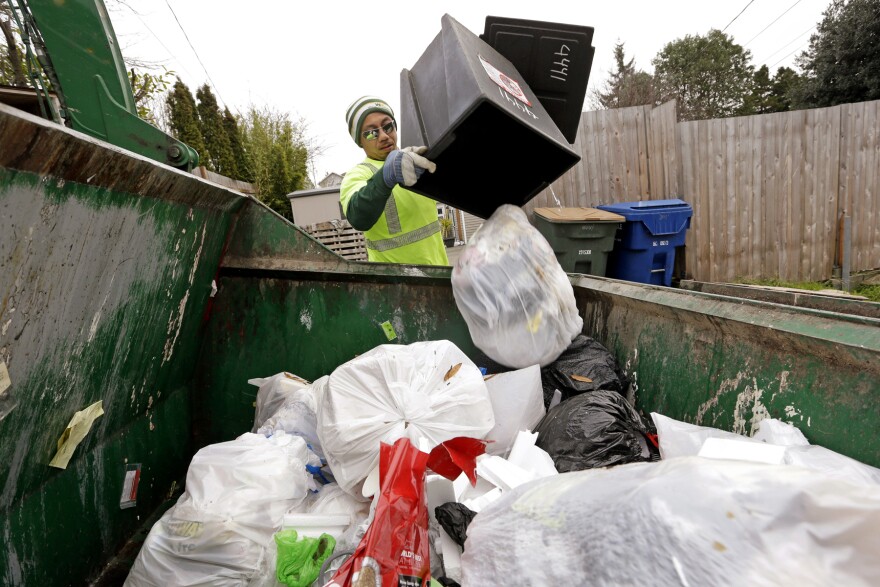The Brookhaven Landfill is on track to stop accepting construction debris next year, according to the town’s recent preliminary budget. Despite local objections, the facility also plans to continue some of its operations.
Kerim Odekon, a member of Brookhaven Landfill Action and Remediation Group (BLARG), which is calling for a regional waste management plan for Long Island, said voters were promised by elected officials in 2019 that the town would completely close its landfill in four years.
As a nearby resident, he maintains “closed means closed.”
“The landfill takes ash from two million people as well — incinerator ash,” Odekon said. “It's moving the goalposts based on their prior commitments.”
Town officials said in a statement that Brookhaven has repeatedly recognized that the landfill will continue to operate until it reaches capacity.
The facility has not accepted solid waste since 1989. It receives incinerator ash from waste-to-energy facilities, which has reduced the volume of waste by almost 90%.
In his latest draft budget, which curbs the acceptance of construction materials and debris, Town Supervisor Ed Romaine wrote that the New York State Department of Environmental Conservation “is responsible for regional waste management.”
“[The state] needs to assume a leadership role in addressing the regional impact of the landfill closure as the Town of Brookhaven’s role diminishes,” Romaine wrote.
A state grant of $250,000 is being used by the towns of Brookhaven and Babylon, as well as Stony Brook University, to study how municipal and private sectors can deal with the overall waste management issues. The money comes from a law approved for the state environmental department.
“When people are telling us that it's going to close, we'll believe it when we see a public transparent, sustainable, equitable, regional waste management plan, and a remediation plan, for the landfill,” Odekon said.
He agrees a regional landfill “requires state coordination.” However, a town spokesperson said the landfill is meant to serve Brookhaven residents, and other municipalities have relied on the landfill as one of the last remaining waste management facilities in the region.
“Once the landfill closes, this will mean sending this Brookhaven household waste material to incinerators outside of the town and/or landfills off of Long Island, like all other towns in Nassau and Suffolk County,” said a spokesperson from the town’s Department of Waste Management. “Contractors, waste management facilities and municipalities within and outside of Brookhaven Town will need to identify means and methods of reduction, transportation and disposal of construction and demolition material, and all other waste items.”
The landfill brings $60 million per year of gross revenue for the town. Romaine plans “numerous energy projects” to bring recurring revenue streams to minimize impact on property taxes by offsetting the loss of the landfill revenues “in just a few years,” according to the budget. To also prepare for its final closure, the town created a post-closure reserve fund. A garbage tax has raised more than $22 million.
As cells of the landfill reach capacity, Brookhaven expects to cap more than 70% of these sections by the end of 2023. According to the Environmental Protection Agency, placing a cap or “cover over contaminated material such as landfill waste … do not destroy or remove contaminants. Instead, they isolate them and keep them in place to avoid the spread of contamination.”
Nearly 140 acres of landfill is already capped. The town budgeted for $2 million last year and in 2023 to cap an additional 25 acres.
A said spokesperson said the budget process for 2024 will not begin until late summer or early fall of this year.
“This is imminent,” said John McNamarra, also with BLARG. “You would think at least five years before a closing that the town would have had a specific plan so people could comment and get input from the people who are most affected by it.”
Nearly 30 plaintiffs have filed lawsuits that involve environmental and possible health impacts of the Brookhaven landfill. The latest notice of a claim against the town was from the parent of a teenager who died of cancer — believed to have been caused by the alleged toxic fumes emitted from the landfill.
The town maintains “Brookhaven implemented ongoing air and water monitoring at this facility several years ago.”
“To continue impacting an area that they've been exploiting for so long,” McNamarra said, “it becomes an issue of environmental justice.”
When the landfill does close, the current plan is to leverage transfer stations in Brentwood, Medford and across the street from the landfill in Yaphank to send hundreds of tons of waste to other states.
“It means continued diesel trucks coming into the transfer station,” Odekon said. “It means emissions. It means plumes. It means there's no end in sight to this.”


